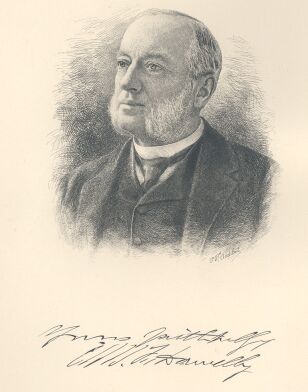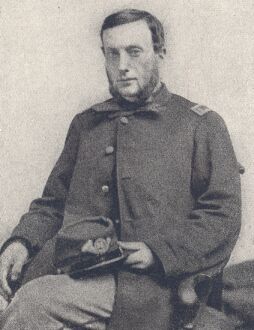Charles Francis Donnelly

(1836-1909)
Boston, Massachusetts

frontis engraving
Katherine E. Conway & Mabel
Ward Cameron, Charles Francis Donnelly: A Memoir
with an Account of Hearings on a Bill for Inspection of Private
School
in Massachusetts in 1888-1889
(New York: James T. White & Co., 1909)
The following biographical commentary is from Katherine E. Conway & Mabel Ward Cameron, Charles
Francis Donnelly: A Memoir with an Account of Hearings on a Bill
for Inspection of Private School in Massachusetts in 1888-1889
3-18, 256 (New York: James T. White & Co., 1909):
The ancient town of Athlone is situated upon the bank of the
great river Shannon. Here Charles Francis Donnelly was born October
14, 1836. He did not grow up, however, in this historic locality,
for in 1837 when he was less than one year old his father removed
with his family to Canada, and established their home in St. John,
New Brunswick.
Soon after their arrival a disastrous fire destroyed Mr. Donnelly's
place of business, and his health also failing he went to Nova
Scotia where Mrs. Donnelly's two uncles . . . were men of property
and position.
Young Charles received his elementary education in private schools
and at the Presbyterian Academy at St. John. He was a studious,
meditative lad, with a quiet, retiring disposition. After school
hours his time was usually occupied in reading, and, having a
most retentive memory, the story of knowledge then acquired lasted
him a lifetime.
. . . .
In 1848 Hugh Donnelly [Charles Francis Donnelly's father], having
recovered his health, removed with his family to Providence, Rhode
Island, where other relatives were prosperously settled. Here
Charles Francis continued his classical studies, and having decided
to follow the profession of law, went to Boston, Massachusetts,
in 1856 and entered the law offices of the Hon. Ambrose A. Ranney.
. . . .
Mr. Donnelly also attended the Harvard Law School and was graduated
with the degree of LL.B. in 1859. In September of the same year
he was admitted to the Suffolk County bar and at once entered
upon the active practice of his profession.
At the time of his admission to the bar Mr. Donnelly had already
shown much taste for literature, had acquired a broad knowledge
of the English classics, and has also received a religious training
uncommon in a young layman.
We find him contributing editorial articles and special correspondence
to the local press in 1859 under the non-de-plume of 'Vindex.'
. . .
During the summer of 1859, Mr. Donnelly spent the months of August
and September in Nova Scotia and New Brunswick. Letters from him,
signed 'Viator,' appeared in the Boston newspapers [with] observations
regarding the places he visited, and the manners and customs of
the men with whom he came in contact. The impressions made on
him during this trip to the land of Longfellow's Evangeline
found expression in the very beautiful poem, 'The Acadians' Hymn,'
that appeared in the New York Leader, August 9, 1862.
For about two years from the early part of 1860 he was a resident
of New York, engaged in the practice of his profession, and in
his free time contributing editorials, prose sketches, and correspondence
to the New York Tribune, New York Leader, Journal
of Commerce, Morning Freeman and other journals, and
to the Knickerbocker Magazine. These contributions were
variously signed 'Lex' and 'Scribe,' but he finally adopted the
pen-name of 'Schuyler Conway,' under which he exercised his notable
poetic gift.
. . . .
Mr. Donnelly considered James Russell Lowell
to be the foremost American poet, and one of his latest poems
was the following sonnet on Lowell's death that appeared in the
Boston Advertiser in August, 1891.
Lowell
No bugle blast sounds through the summer air;
Nor tramp of riderless and neighing steed,
In solemn march behind the car we heed;
Nor muffled drum is heard; nor trumpet blare;
Nor volleyed fire; nor shrouding smoke is seen.
Yet in the earth to-day a soldier's form
We laid; one who brave bore the brunt and storm
Of battle front with knightly skill and mien.
Rest, minstrel, after all earth's weary strife; —
Fair Harvard hath borne many sons, but none
So tenderly beloved as those who gave
Their youth and manhood's prime, and even life,
To Freedom's cause, until the field was won,
And no man dare to car his brother slave.
Towards the end of 1862 we find Mr. Donnelly again in Boston
active in recruiting for the Fifty-fifth Regiment, which had been
organized with the distinct understanding that it should go to
the front for nine month's service as an Irish-American regiment.
In this regiment he held the rank of lieutenant, and within a
few months six companies had been drafted and a good beginning
made towards the formation of the seventh. [The
regiment did not, however, proceed to the front as originally
planned.]

"Mr. Donnelly at the Age
of 26"
Katherne E. Conway & Mabel
Ward Cameron, Charles Francis Donnelly: A Memoir (New York: James
T. White, 1909)
In the spring of 1863, while on a visit to Washington, Mr. Donnelly
sent some pen portraits of 'People One Meets on Pennsylvania Avenue,'
to the New York Leader. These sketches related to soldiers,
statesmen, and sages . . . . In Washington, as during his longer
sojourns in New York, he was fortunate in meeting the great men
of his profession, and had also much pleasant intercourse with
the literary men and eminent journalists of a period peculiarly
rich in characters of interest.
In 1864 we find Mr. Donnelly associated with James Gerrish as
counsel for the Commonwealth in the case of two little children
in the public school in Shirley, Massachusetts, who had been punished
with great severity because they declined to read from the Protestant
version of the Bible. Mr. Donnelly appealed to the existing law
as sufficient to protect Catholic rights, and on these grounds
won the case.
. . . .
[Donnelly continued to practice law and] "early on the morning
of Sunday, January 31, 1909, without premonition of any kind,
he passed to his well-earned rest."
Poetry
Charles Francis Donnelly, Roma and Other Poems (New York: James T. White & Co., 1909)
Writings
Charles Francis Donnelly, Eliza Despres; or, The
Fatal Effects of Reading Bad Books (Baltimore: John Murphy,
1882)
Bibliography
Katherine Eleanor Conway& Mabel Ward Cameron, Charles Francis Donnelly: A Memoir (New York: James T. White & Co., 1909) [online text]
[See also: The National Cyclopedia of Biography 150 (New York: James T. White & Co., 1910)(Suppl. 1)][online text]
* My thanks to Nolan Smith at American
Worlds Books, Hamden, Connecticut, for first bringing Charles Francis
Donnelly to my attention and aiding in my acquisition of Donnelly's Roma and Other Poems.
|

